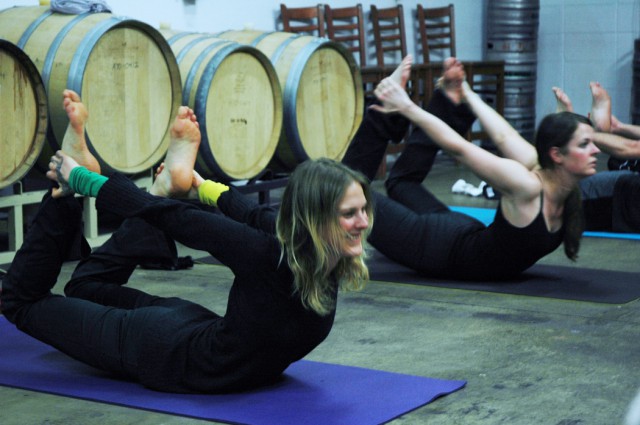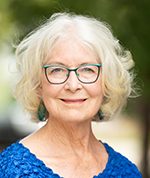
Tabitha Farrar places her hands and feet on her mat in the downward-facing dog position and releases a deep breath. When her face appears again, a smile breaks out. Her co-worker and, for the moment, yoga classmate, is squirming next to her while Ted Nugent plays in the background and the sound of glasses clinking and laughing rings out from the brewery bar in the next room.
Farrar is no stranger to unconventional yoga classes. The laid-back 31-year-old has been teaching in various unconventional places around Boulder County for the past year and a half. That’s when she started her nonprofit, Angel Organic, with a mission to offer yoga to under-served populations — in other words, not just middle-class women with gym or studio memberships.
“Sunshine brought me to Boulder,” Farrar says in her native British accent. “And I saw that Boulder was so full of yoga studios and yoga teachers, but no one was teaching to those people who need it most.”
So Farrar, who says yoga saved her from a devastating exercise disorder, came up with the idea of starting a nonprofit. She reached out to other community organizations with a similar goal of healing: those working with the homeless, veterans, cancer survivors, the disabled, victims of domestic violence and at-risk youth. Many among these groups either don’t seek out yoga or may not have the financial means to take classes.
“We do community yoga classes that are open to the public and free,” Farrar says over a beer after the hour-long “beerasana” community class at Asher Brewing Company in Gunbarrel. Angel Organic hosts beerasana there the last Tuesday of each month. Farrar jokes that she got the idea to hold a class at a brewery after her husband, Matt, said he wouldn’t take a yoga class unless he could combine it with beer.
“We also offer yoga therapy, and those classes are private to the organization we’re working with, and tailored to them,” she continues.
For instance, when she’s in front of a class of teenage boys at Boulder’s Family Learning Center, she finds her traditional style of slow, meditative teaching doesn’t quite work.
“The first time I taught at the Family Learning Center was for a class of 14-year-old football players. I walked in the room and they were literally leapfrogging over each other — their energy level was through the roof,” Farrar recalls. “At first I thought, ‘I don’t know if this is going to work.’ Then I went straight into power yoga, and after about 20 minutes their energy dropped way down, and by the end I was able to do a three-minute meditation and they all actually did it.”
That moment that sticks in Farrar’s mind as an early success story. Her goal of reaching people through movement and meditation and bringing about a positive change seemed possible.
“I was gobsmacked,” she says. “I mean, I know yoga works and I was shocked.”
That moment was followed by others, and Farrar was quickly able to grow her organization from offering just a few classes to 18 classes a week.
One of those classes is offered to the Rocky Mountain Team Survivor Group in Boulder, a group of women who have either survived cancer or are currently going through treatment. Dora Briegleb, volunteer executive director of the nonprofit’s board and a cancer survivor herself, describes it as a support group that unites through physical activity. The group meets each week for a walk along Boulder Creek and then on to the senior center for their yoga session.
“What it does for us is, after we go on a vigorous walk, it relaxes us, it stretches us, it complements what we’re doing,” Briegleb says. “As a survivor, you have concerns about your well-being, your mortality; recurrence is possible. With yoga you get the benefit physically but also mentally, emotionally and even spiritually. It has been a very positive experience.”
Briegleb says it’s not uncommon to be approached — like she was by Farrar — by someone who wants to offer a free class or service to her organization. Many times, though, those interactions turn out to be ploys for potential paying clients and the experience rubs her the wrong way. That was not the case with Farrar.
“I’m just thrilled with her generosity of spirit, not only to us but to other needy groups who might not have the money and time to take yoga in this town,” she says. “She’s very generous. She’s never asked us for anything. She has this vision of how yoga can transform your life.”
“I volunteer because of the mission — movement transforms and adds value to your life, and access to that should not just be for the privileged,” says Stacey Mulvey, who teaches weekly classes for Angel Organic at Prana. “I used to be completely sedentary. I worked at a desk. And I went through my own journey to find movement. That’s what inspired me to be a teacher.”
Mulvey also had the opportunity to teach at Camp Paradox, near Ft. Collins, which was geared toward underserved populations and included a mix of disabled adults, veterans and their families.
“We camped together, we did a ropes course together and did trust exercises,” she remembers. “And then I was teaching them yoga.”
What resonated the most for her was the transformation among the veterans, most of whom had never done yoga before.
“At the end, we talked about our experience, and one guy said it was the first time since coming back from Iraq when he’d been in a group of people and hadn’t gotten into a fight with anyone,” she says.
Farrar says she hopes to have more opportunities for classes, like one for people in wheelchairs. She’s fundraising to buy special equipment. Of course, Farrar adds, she would also like to be able to afford a studio and office space. But for now, she’s content to let the organization grow organically. What it really comes down to is reaching people.
“If we can heal people on an individual level,” she says, “we will have a happier community.”
Respond: [email protected]














